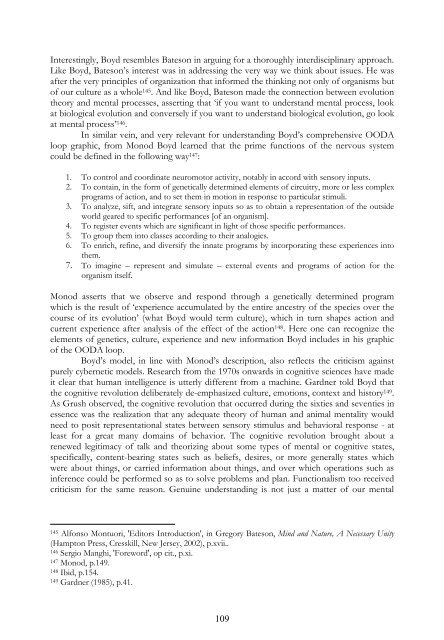Science, Strategy and War The Strategic Theory of ... - Boekje Pienter
Science, Strategy and War The Strategic Theory of ... - Boekje Pienter
Science, Strategy and War The Strategic Theory of ... - Boekje Pienter
You also want an ePaper? Increase the reach of your titles
YUMPU automatically turns print PDFs into web optimized ePapers that Google loves.
Interestingly, Boyd resembles Bateson in arguing for a thoroughly interdisciplinary approach.Like Boyd, Bateson’s interest was in addressing the very way we think about issues. He wasafter the very principles <strong>of</strong> organization that informed the thinking not only <strong>of</strong> organisms but<strong>of</strong> our culture as a whole 145 . And like Boyd, Bateson made the connection between evolutiontheory <strong>and</strong> mental processes, asserting that ‘if you want to underst<strong>and</strong> mental process, lookat biological evolution <strong>and</strong> conversely if you want to underst<strong>and</strong> biological evolution, go lookat mental process’ 146 .In similar vein, <strong>and</strong> very relevant for underst<strong>and</strong>ing Boyd’s comprehensive OODAloop graphic, from Monod Boyd learned that the prime functions <strong>of</strong> the nervous systemcould be defined in the following way 147 :1. To control <strong>and</strong> coordinate neuromotor activity, notably in accord with sensory inputs.2. To contain, in the form <strong>of</strong> genetically determined elements <strong>of</strong> circuitry, more or less complexprograms <strong>of</strong> action, <strong>and</strong> to set them in motion in response to particular stimuli.3. To analyze, sift, <strong>and</strong> integrate sensory inputs so as to obtain a representation <strong>of</strong> the outsideworld geared to specific performances [<strong>of</strong> an organism].4. To register events which are significant in light <strong>of</strong> those specific performances.5. To group them into classes according to their analogies.6. To enrich, refine, <strong>and</strong> diversify the innate programs by incorporating these experiences intothem.7. To imagine – represent <strong>and</strong> simulate – external events <strong>and</strong> programs <strong>of</strong> action for theorganism itself.Monod asserts that we observe <strong>and</strong> respond through a genetically determined programwhich is the result <strong>of</strong> ‘experience accumulated by the entire ancestry <strong>of</strong> the species over thecourse <strong>of</strong> its evolution’ (what Boyd would term culture), which in turn shapes action <strong>and</strong>current experience after analysis <strong>of</strong> the effect <strong>of</strong> the action 148 . Here one can recognize theelements <strong>of</strong> genetics, culture, experience <strong>and</strong> new information Boyd includes in his graphic<strong>of</strong> the OODA loop.Boyd’s model, in line with Monod’s description, also reflects the criticism againstpurely cybernetic models. Research from the 1970s onwards in cognitive sciences have madeit clear that human intelligence is utterly different from a machine. Gardner told Boyd thatthe cognitive revolution deliberately de-emphasized culture, emotions, context <strong>and</strong> history 149 .As Grush observed, the cognitive revolution that occurred during the sixties <strong>and</strong> seventies inessence was the realization that any adequate theory <strong>of</strong> human <strong>and</strong> animal mentality wouldneed to posit representational states between sensory stimulus <strong>and</strong> behavioral response - atleast for a great many domains <strong>of</strong> behavior. <strong>The</strong> cognitive revolution brought about arenewed legitimacy <strong>of</strong> talk <strong>and</strong> theorizing about some types <strong>of</strong> mental or cognitive states,specifically, content-bearing states such as beliefs, desires, or more generally states whichwere about things, or carried information about things, <strong>and</strong> over which operations such asinference could be performed so as to solve problems <strong>and</strong> plan. Functionalism too receivedcriticism for the same reason. Genuine underst<strong>and</strong>ing is not just a matter <strong>of</strong> our mental145 Alfonso Montuori, 'Editors Introduction', in Gregory Bateson, Mind <strong>and</strong> Nature, A Necessary Unity(Hampton Press, Cresskill, New Jersey, 2002), p.xvii..146 Sergio Manghi, 'Foreword', op cit., p.xi.147 Monod, p.149.148 Ibid, p.154.149 Gardner (1985), p.41.109
















